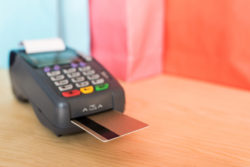 FACTA credit card receipt laws protect consumers against the constant threat of fraud and identity theft by requiring businesses to adhere to strict privacy standards.
FACTA credit card receipt laws protect consumers against the constant threat of fraud and identity theft by requiring businesses to adhere to strict privacy standards.
Among other requirements, FACTA credit card receipt laws require businesses to limit the amount of information exposed on receipts. Businesses that fail to follow these federal FACTA credit card receipt laws could face potential legal repercussions.
FACTA (the Fair Accurate Transactions Act) is a federal law enacted in 2003 to help address the growing problem of credit card fraud and identity theft. FACTA primarily affects electronic debit and credit card receipts by requiring businesses to limit the amount of information printed.
Businesses were given until 2006 to update their cash registers and transaction software to be FACTA compliant, and are expected to continuously monitor their software to insure federal compliance.
Overview of FACTA Credit Card Receipt Laws
FACTA credit card receipt laws require businesses to perform the process of truncation on electronically printed receipts, which is limiting the information shown on the slip of paper.
Under FACTA, no more or less than the last five digits of the card number can be present and the expiration date must be completely absent. This policy applies to both debit and credit card receipts, which is meant to help decrease the chances of fraud and identity theft.
It is important to note that these FACTA credit card receipt laws only apply to electronically printed receipts from cash registers, kiosks, and restaurant tickets. This means that imprinted or handwritten receipts do not have to be FACTA compliant. Consumers may prefer to pay with cash instead of generating an imprinted or handwritten receipt.
Both credit card fraud and identity theft are serious concerns plaguing consumers, with numerous United States citizens suffering from one or both each year.
In addition to the truncation process, FACTA credit card receipt laws allow consumers access to a free annual credit report from three big credit reporting companies Equifax, Experian, and TransUnion.
In cooperation with the Federal Trade Commission, these major credit reporting agencies have set up AnnualCreditReport.com to provide consumers with free annual credit reports.
These credit reports are meant to show consumers their credit score, along with any unusual spending behavior. Consumers can also request their bank or credit union to issue fraud alerts for any suspicious spending behavior, so actions can be taken to minimize the financial damages.
Due to the widespread issue of fraud and identity theft, it is important that businesses follow FACTA credit card receipt laws. Businesses found to be in violation of FACTA, could face fines between $100 to $1,000, depending on whether or not willful intent can be proven.
Consumers who are thinking about filing a FACTA lawsuit should keep their receipts that exhibit the violations along with other relevant documentation. FACTA lawsuits are often filed after a consumer brings the issue up with the company, but no corrective action was taken.
Free FACTA Class Action Lawsuit Investigation
If you made one or more purchases and the retailer provided you with a receipt that contained more than the last five digits of your credit or debit card number or the expiration date, you may be eligible for a free class action lawsuit investigation and to pursue compensation for these FACTA violations.
ATTORNEY ADVERTISING
Top Class Actions is a Proud Member of the American Bar Association
LEGAL INFORMATION IS NOT LEGAL ADVICE
Top Class Actions Legal Statement
©2008 – 2025 Top Class Actions® LLC
Various Trademarks held by their respective owners
This website is not intended for viewing or usage by European Union citizens.














